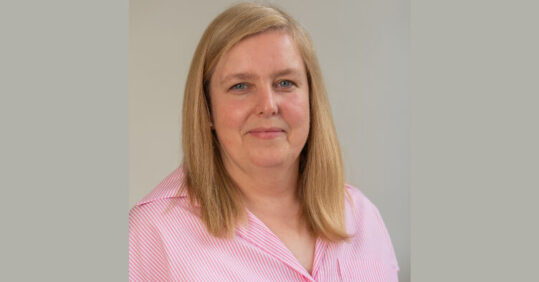Sally Kum, associate director for nursing and health information at Breast Cancer Now, and Melanie Sturtevant, associate director of policy, evidence and influencing, share their expertise on how nurses in general practice can play a vital role in diagnosing breast cancer early.
What role can practice nurses play in diagnosing breast cancer early?
Sally Kum –
‘Primary care professionals can play such an important role in supporting the early diagnosis of breast cancer, crucially helping to encourage honest conversations with women about the signs and symptoms of the disease, the importance of checking their breasts regularly, and of getting any new or unusual changes checked by a GP.
‘A conversation with a practice nurse can be an opportunity for a person to discuss breast checking. While many women may know that a lump can be a possible sign of breast cancer, it’s vital that they know there are other changes to also be aware of, whether changes in size or shape of the breast, a change to the skin such as puckering or dimpling, or a change in the colour of the breast.
‘At Breast Cancer Now we encourage people to get to know their ‘normal’ by checking their breasts regularly, following TLC – Touch your breasts; Look for changes; Check anything new or unusual with a GP.
‘Primary care teams play a critical role in ensuring a person enters the secondary care pathway, with the clock for the 28-day Faster Diagnosis Standard (FDS) ticking from when someone is urgently referred from a GP with possible symptoms of breast cancer to see a specialist.’
Melanie Sturtevant –
‘Primary care professionals can help to raise vital public health awareness around breast screening, and also carry out assessments if people are concerned about their family history of breast cancer, referring people on, where appropriate.
Both of these are key tools in supporting the early diagnosis of breast cancer. This is so important as the sooner breast cancer is detected, the better the chance of treatment being successful.’
What tips do you have for practice nurses to improve their practise?
Sally Kum –
‘Following a breast cancer diagnosis, a Cancer Care Review conversation between a patient and their practice nurse about their experience, offers a crucial opportunity for a patient to reflect and discuss the impact of breast cancer treatment, any concerns, support or information needs.
‘Also, it presents the opportunity to talk about signs and symptoms of recurrence and incurable secondary breast cancer, as prompt diagnosis matters. However, our 2019 report, which looked at the experiences of over 2,000 people living with secondary breast cancer, found that many were experiencing avoidable delays. 23% of respondents had to see their GP three or more times before they were diagnosed with breast cancer. Among respondents who had previously had breast cancer, this was almost a quarter (24%).
‘A prompt diagnosis of secondary breast cancer means that patients can begin treatment and access supportive care as quickly as possible, which can relieve symptoms and have a dramatic impact on quality of life.
‘That’s why, alongside increasing the information provided to patients on the signs and symptoms of secondary breast cancer, Breast Cancer Now are helping GPs to recognise cases of secondary breast cancer as quickly as possible.
‘We’re really pleased to have worked with GatewayC to develop a new course to support GPs and other primary care professionals in recognising the symptoms of breast cancer recurrence (including secondary breast cancer) and improving confidence in decision-making regarding referral back to breast cancer services.
‘We know that a diagnosis of breast cancer impacts every facet of people’s lives, which is why more must be done to normalise breast health and breast checking, and to start to break down taboos and open up the conversation around breast cancer.
‘This is why, inspired by people’s real life experiences of breast cancer, we’ve created ‘The Chat’, the UK’s first group messaging drama series, to help encourage the honest, open conversations that tend to be shied away from in society around breast cancer.’
Why is it so urgent to address breast cancer diagnosis?
Melanie Sturtevant –
‘At Breast Cancer Now, we are urgently calling for the government to raise the Faster Diagnosis Standard target to 95%, to raise the ambition for breast cancer, and deliver the gold standard of care that women deserve. Right now, the 75% target can be met without a single case of breast cancer being diagnosed.
‘The breast screening programme was heavily disrupted by Covid-19, with nearly a million fewer women having breast screening since the start of the pandemic. While record numbers were invited to routine breast screening in 2021/22, the frightening reality is, that the proportion of women taking up their invite remains at an historic low for the second year running.
‘Despite our incredible NHS staff continuing to go above and beyond to provide the best standard of care for breast cancer patients, women will continue to be denied the best chance of timely breast cancer diagnosis and treatment until the government shows it’s serious about fixing the issues facing the breast screening programme in England.
‘It must take urgent action to recover standards, and set out a concrete plan to tackle the programme’s underlying issues and prepare breast screening for the future, which means taking decisive action to remove barriers to screening, ring-fence investment, fill workforce gaps and bring the programme into the 21st century to guarantee women’s right to accessible, equitable and effective breast screening.
‘As part of Breast Cancer Now’s #NoTimeToWaste campaign, providing convenient, flexible, and equitable access to screening is a core principle of the charity’s screening transformation blueprint. The measures we’re suggesting will help drive uptake and mitigate the damage caused by Covid-19 over the next five years.’
About Breast Cancer Now:
Breast Cancer Now works to provide the best information and support for people affected by breast cancer, wherever in the UK they may be. It offers support services and access to specialist nurses, who can be reached via the charity’s helpline on 08088006000 and 24/7 online forum. The charity also prides itself in ‘fighting for the best possible treatment, services, and care, for anyone affected by breast cancer’.







